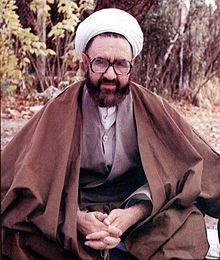- Morteza Motahhari
-
Muslim scholar
Murtaza Motahhari
Title Ayatollah Born February 3, 1920 Died May 1, 1979 Main interests Fiqh, Kalam and philosophy Ayatollah Murtaza Motahhari (مرتضی مطهری; February 3, 1920 – May 1, 1979) was an Iranian scholar, cleric, lecturer, and politician.
Motahhari is considered among the important influences on the ideologies of the Islamic Republic, and was a co-founder of Hosseiniye Ershad and the Combatant Clergy Association (Jāme'e-ye Rowhāniyat-e Mobārez). Motahhari was a disciple of Ayatollah Khomeini during the Shah's reign and formed the Council of Revolution of Iran at Khomeini's request. He was chairman of the council at the time of his assassination.[1]
Contents
His life and works
Murtaza Motahhari attended the Hawza of Qom from 1944–1952, and then joined the University of Tehran, where he taught philosophy for 22 years. Between 1965 and 1973 he also gave regular lectures at the Hosseiniye Ershad in Northern Tehran.
Murtaza Motahhari wrote several books on Islam, Iran, and historical topics. His emphasis was on teaching rather than writing. However, after his death, some of his students worked on writing these lectures and manage them in order to publish them as books. As of mid-2008, the "Sadra Publishings" has published more than sixty books of Motahari and about 30 books written about Motahari or quoted from his speeches. Some of them are described below.
Morteza Motahhari opposed what he called groups who "depend on other schools, especially materialistic schools" but who present these "foreign ideas with Islamic emblems". In a June 1977 article he wrote to warn "all great Islamic authorities" of the danger of "these external influential ideas under the pretext and banner of Islam." It is thought he was referring to the People's Mujahideen of Iran and the Furqan Group (Guruh-i Furqan).[2]
On May 1, 1979 Murtaza Motahhari was assassinated by gunshot by a member of the Furqan Group after leaving a late meeting at the house of Yadollah Sahabi. Ordibehesht 12 (1 or 2 May), the Persian date on which Murtaza Motahhari was assassinated, is celebrated as "Teachers Day" in Iran.
Murtaza Motahhari is the father in law of Iran's former secretary of National Security Council Ali Larijani. It was by Motahhari's advice that Larijani switched from Computer Science to Western Philosophy for graduate school.
In honor of Murtaza Motahhari, a major street in Tehran (Takhte Tavoos--Peacock Throne in English) was named after him upon his death shortly after the Iranian revolution in 1979. Murtaza Motahhari Street connects Sohrevardi Street and Vali Asr Street, two major streets in Tehran.
Awards
- UNESCO Award, 1965.[3]
List of Publications
- Tawhid (Monotheism)
- Adl -e- Elahi (Divine Justice)
- Nubuwwah (Prophet-hood)
- Ma'ad (The Return)
- Hamase -e- Husaini
- Seiry dar nahj al-balagha
- Seiry dar sirey'e a'emeye at-har
- Seiry dar sirey'e nabavi
- Insan -e- Kamel (The Complete Human)
- Payambar -e- Ommi
- Osool -e Falsafa va ravesh -e- Realism (The principles of Philosophy and the method of Realism)
- Sharh -e- Manzume (A description done by Motahari on Manzume which is an old philosophical poem written by Mulla Hadi Sabzevary)
- Imamat va rahbary
- Dah Goftar (A selection of 10 articles of Motahari)
- Bist Goftar (A selection of 20 articles of Motahari)
- Panzdah Goftar (A selection of 15 articles of Motahari)
- Azadi -e- Ma'navi
- Ashneya'ei ba Quran (Being familiar with the Qur'an)
- Ayande -e- Enghlab -e- Islami (The future of the Islamic Revolution)
- Ehyaye Tafakor -e- Islami (Giving Life to the Islamic thinking)
- Akhlagh -e- Jensi (Sexual Discipline)
- Islam va niazha -ye- Jahan
- Emdadhaye gheibi dar zendegi -e- bashar
- Ensas va sarenevesht
- Panj maghale
- Ta'lim va tarbiyat dar Islam
- Jazebe va dafe'eye Ali
- Jehad (The Holy War of Islam and Its Legitimacy in the Quran)
- Hajj (Pilgrimage)
- Hekmat-ha va andarz-ha
- Khatemiyat
- Khatm -e- Nobowat
- Khadamāt-e moteqābel-e Eslām va Īrān (The Contributions of Islam and Iran to each other)
- Dastan -e- Rastan
- Darshaye Asfar
- Shesh maghale
- Erfan -e- Hafez
- Elale gerayesh be madigary
- Fetrat
- Falsafe -ye- Akhlagh
- Falsafe -ye- Tarikh
- Ghiam va enghelab -e- Mahdi
- Koliyat -e- olume Islami
- Goft va gooye chahar shanbe
- Masaleye Hejab
- Masaleye Reba
- Masaleye Shenakht
- Maghalate falsafi (A selection of Philosophical articles written by Motahari)
- Moghadameyi bar jahanbiniye Islami (Consists of 6 different books written about this subject)
- Nabard -e- hagh va batel
- Nezam -e- hoghoghe zan dar Islam
- Nazari bar nezame eghtesadiye Islam
- Naghdi bar Marxism
- Nehzat-haye Islami dar 100 sale akhir
- Sexual Ethics in Islam and in the Western World (English)
- Vela'ha va velayat-ha
- Azadegi
- Ayineye Jam (Hafez poetic book with Motahari's notations on it)
See also
- Modern Islamic philosophy
- Mohammad Mofatteh
- Mohammad Beheshti
- Muhammad Husayn Tabatabaei
- Ali Shariati
References and notes
External links
- Biography
- Online books by Murtaza Mutahhari
- Biography and downloadable books (in Persian)
- سایت نسیم مطهر، نخستین سایت ویژه سیر مطالعاتی آثار شهید مطهری
- Arabic biography of Motahari with Arabic translations of some of his lectures
Party political offices Preceded by
NoneSecretary-General of Combatant Clergy Association
1978-1979Succeeded by
Mohammad-Reza Mahdavi KaniPolitical offices Preceded by
NonePresident of Council of Islamic Revolution
1979Succeeded by
Mahmoud TaleghaniCategories:- Iranian ayatollahs
- Iranian writers
- Muslim philosophers
- Iranian philosophers
- People from Mashhad
- 1920 births
- 1979 deaths
- Assassinated Iranian politicians
- Deaths by firearm in Iran
- People murdered in Iran
- Iranian terrorism victims
- Murdered educators
- Combatant Clergy Association politicians
Wikimedia Foundation. 2010.
